CHF
What is it?
- Cardiac Output is insufficient to meet the body’s perfusion demands
- ↑ Aldosterone & ↓ renal perfusion leads to fluid retention
- ↑ Sympathetic nervous system stimulation leads to ↑ cardiac workload
- ↑ Pressure in the pulmonary system = Left-Sided HF
- ↑ Pressure in the systemic system = Right-Sided HF

Risk Factors

Valve Disorders & Atrial fibrillation

Viral illnesses

Diabetes

Smoking & Alcohol

Obesity & Sleep Apnea
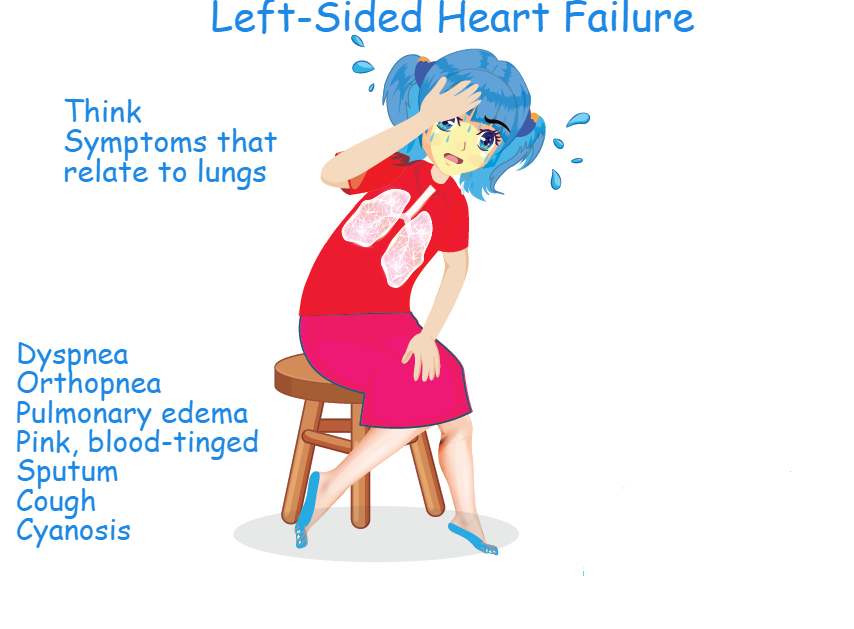
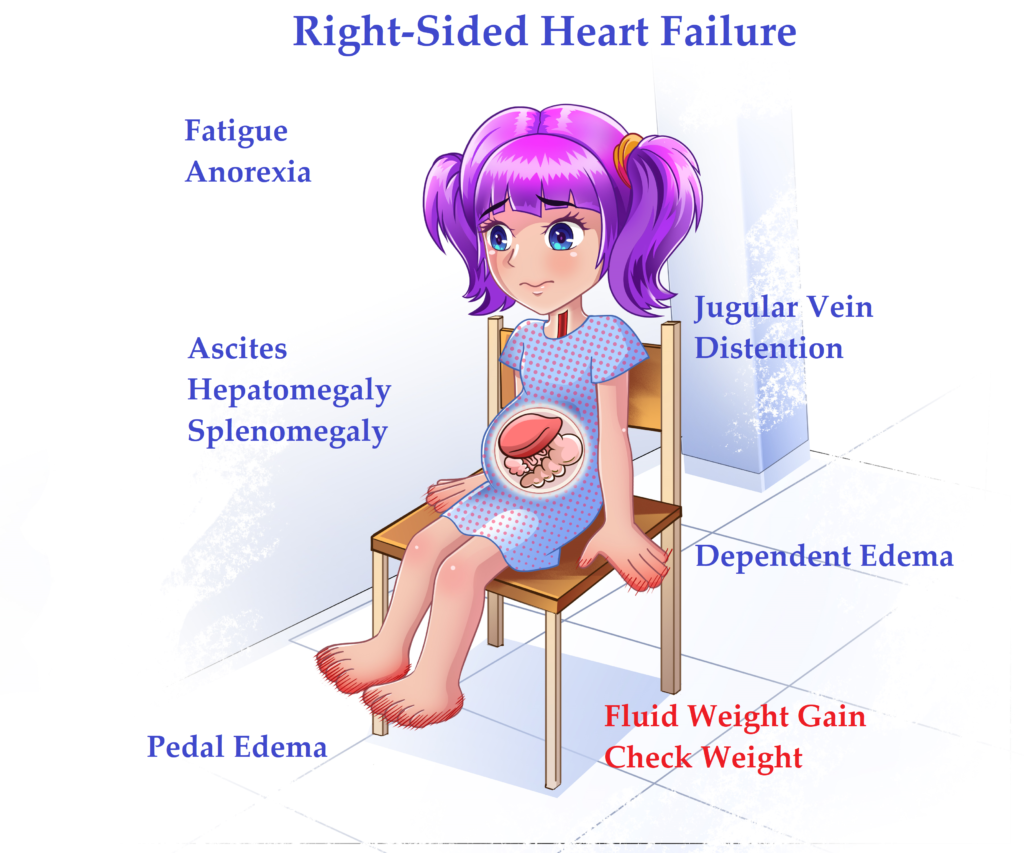
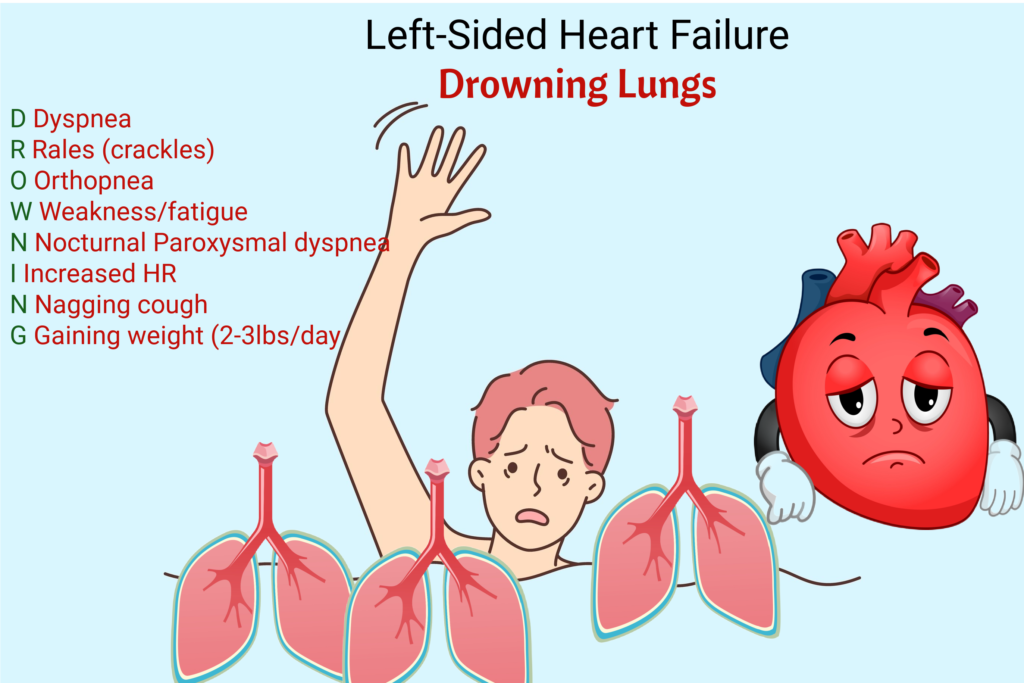
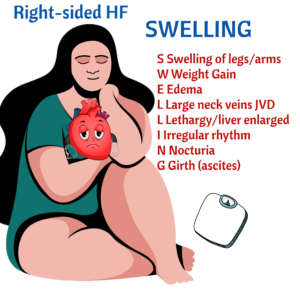
Quiz Summary
0 of 1 Questions completed
Questions:
Information
You have already completed the quiz before. Hence you can not start it again.
Quiz is loading…
You must sign in or sign up to start the quiz.
You must first complete the following:
Results
Results
0 of 1 Questions answered correctly
Your time:
Time has elapsed
You have reached 0 of 0 point(s), (0)
Earned Point(s): 0 of 0, (0)
0 Essay(s) Pending (Possible Point(s): 0)
Categories
- Not categorized 0%
-
Very important: Don’t pay attention to the color of the boxes to figure out which was the right answer. Just pay attention whether there is an X or not on the side of the boxes. The X’s = right answer.
- 1
- Current
- Review
- Answered
- Correct
- Incorrect
-
Question 1 of 1
1. Question
For each of the symptom type an X to specify whether the symptom indicates right-sided heart failure or left-sided heart failure.
-
Symptom Right-Sided HF Left-Sided HF Lung crackles/Rales Hepatomegaly Noctural paroxysmal dyspnea Nocturia Ascites Pink Frothy Sputum Orthopnea/Dyspnea Nagging Cough JVD Swelling of legs and arms Splenomegaly Fatigue
CorrectIncorrect -
Diagnostic Tests
- Echocardiogram
- Chest X-ray (cardiomegaly)
- ↑ BNP (B-type natriuretic peptides)
- Cardiac stress test

Treatment
- Treat cause
- ACE inhibitors to ↓ preload/afterload
- Beta blockers to counteract Sympathetic nervous system (↓ heart rate and BP)
- Diuretics to ↓ fluids
- Digoxin to ↑ Cardiac output
- Acute heart failure: Dobutamine IV drip to ↑ contractility

Nursing Interventions: NCLEX Alert
- Semi/high fowlers to ↓ venous return. THIS IS THE PRIORITY ACTION. IT CAN BE DONE FAST
- Administer Oxygen (PRIORITY ABC)
- I & O let’s you know if the client is retaining fluids, but weight is the MOST accurate indicator of fluid balance.
- Daily weights before breakfast
- Report weight gain 2-3 lbs/day
- Assess lung sounds (does the client have water in their lungs?)
- Administer diuretics (furosemide)
- Monitor potassium levels
- ↑ K diet if on lasix (furosemide): dried fruit, bananas, oranges, & melons
- Administer ACE Inhibitors, beta blockers, and digoxin
- Monitor cardiac rhythm. Watch for atrial fibrillation
- Monitor digoxin levels
- Fluid restriction
- Diet: ↓ Na, ↓ fat, ↓ cholesterol, ↓ water.
- Balance rest/activity to decrease cardiac demands/oxygen demands.
- Gradually ↑ exercise
- Educate about medications
- Remember that hypokalemia potentiates digoxin toxicity.
- One important symptom of hypokalemia is muscle weakness.
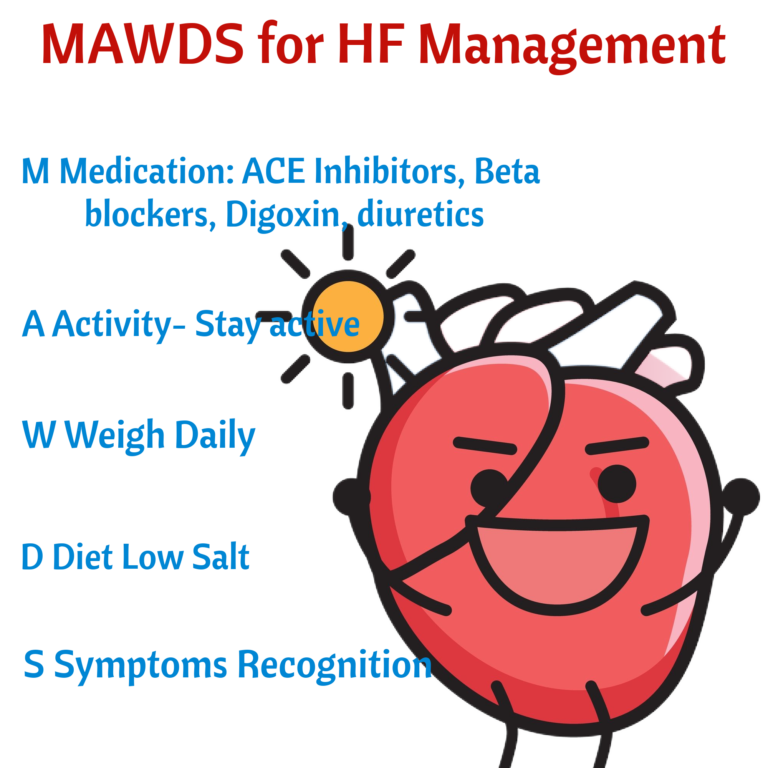
NCLEX Alert: A lot of the questions on CHF are based on MAWDS. Teaching the client to stay active, to weight daily (report weight gain or 2-3 lbs/24 hours), to be compliant with meds, to follow low salt diet, and to recognize symptoms early to prevent an exacerbation.
Quiz Summary
0 of 7 Questions completed
Questions:
Information
You have already completed the quiz before. Hence you can not start it again.
Quiz is loading…
You must sign in or sign up to start the quiz.
You must first complete the following:
Results
Results
0 of 7 Questions answered correctly
Your time:
Time has elapsed
You have reached 0 of 0 point(s), (0)
Earned Point(s): 0 of 0, (0)
0 Essay(s) Pending (Possible Point(s): 0)
Categories
- Not categorized 0%
- 1
- 2
- 3
- 4
- 5
- 6
- 7
- Current
- Review / Skip
- Answered
- Correct
- Incorrect
-
Question 1 of 7
1. Question
Which symptom is mainly associated with right-sided heart failure?
CorrectIncorrect -
Question 2 of 7
2. Question
Which of the following is a symptoms of digoxin toxicity?
CorrectIncorrect -
Question 3 of 7
3. Question
Which of the following may potentiate digoxin toxicity?
CorrectIncorrect -
Question 4 of 7
4. Question
What is the best position for a client in heart failure?
CorrectIncorrect -
Question 5 of 7
5. Question
Which of the following woud you do first for a patient in heart failure?
CorrectIncorrect -
Question 6 of 7
6. Question
If you admit a client with heart failure, what would be the priority?
CorrectIncorrect -
Question 7 of 7
7. Question
Which of the following is a symptom of hypokalemia?
CorrectIncorrect
Case Study
A 76-year-old male client is admitted with shortness of breath x 2 days. The client states “I’m having trouble catching my breath and my legs get more swollen everyday.” The client has a history of Congestive Heart Failure, Diabetes Type 2, and MI 5 years ago with a stent placement to his RCA.
Temp: 98.8º F, HR 99 BPM; BP 145/55 mm Hg; RR 24 bpm. Pain 0 on a scale of 0 to 10. SpO2 = 89% on RA
1000 am: Pt alert, oriented but restless due to SOB. Client able to speak in short sentences, able to answer questions. Lungs w/rales bilaterally, respiratory rate 24, regular but labored. S1, S2, and S3 heart sounds present. All peripheral pulses palpable 2+, skin warm/dry, 3+ pitting edema to bilaterally extremities. Client has facial and periorbital edema. Active bowel sounds x 4 quadrants. Peripheral IV to right hand with NS to keep vein open.
- Sodium 132 mEq/L (135-145 mEq/L)
- Potassium 3.4 mEq/L (3.5-5 mEq/L
- Chloride 95 mEq/L (96-106 mEq/L)
- Blood Urea Nitrogen 18 mg/dl (7-20 mg/dl)
- Creatinine 1.1 mg/dl (0.7-1.3 mg/dl)
- Blood Sugar 120 mg/dl (100-125 mg/dl)
- BNP 950 (< 100 ng/dl)
- Captopril 20mg po daily
- Lasix 40mg po daily
- Digoxin 0.125 mcg po daily
- Pioglitazone 45 mg po in AM
Quiz Summary
0 of 1 Questions completed
Questions:
Information
You have already completed the quiz before. Hence you can not start it again.
Quiz is loading…
You must sign in or sign up to start the quiz.
You must first complete the following:
Results
Results
0 of 1 Questions answered correctly
Your time:
Time has elapsed
You have reached 0 of 0 point(s), (0)
Earned Point(s): 0 of 0, (0)
0 Essay(s) Pending (Possible Point(s): 0)
Categories
- Not categorized 0%
- 1
- Current
- Review
- Answered
- Correct
- Incorrect
-
Question 1 of 1
1. Question
For each client finding, put an X to specify whether it requires immediate follow up or not.
-
Client Findings NOT requiring immediate follow up Requires immediate follow up MI w/Stent 5 years ago Saturations 89% on RA Restlessness Respiratory Rate 24 Pitting Edema Potassium level Sodium Level
CorrectIncorrect -

Time's up

